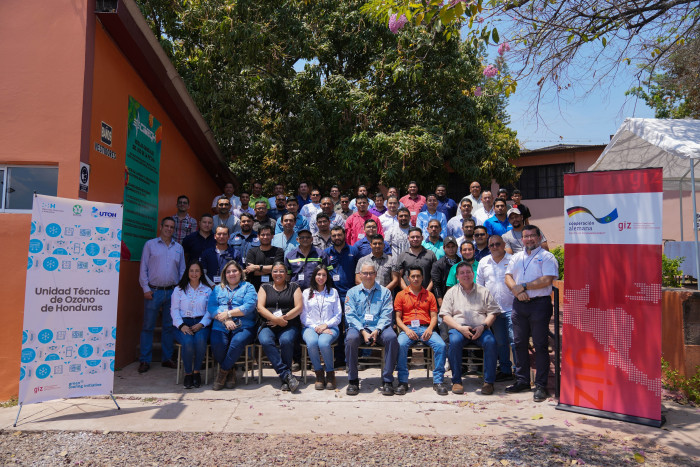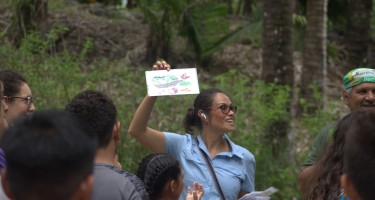Moving Towards Sustainable Refrigeration
Training on Safe Handling of Flammable Refrigerants

Practical workshop. © GIZ Proklima
Following a strategic partnership between the Secretariat of Natural Resources and Environment (SERNA), Honduras, via its Ozone Technical Unit of Honduras (UTOH) and the Green Cooling Initiative III, a project under the Deutsche Gesellschaft für Internationale Zusammenarbeit (GIZ) GmbH, the training 'Safe Handling of Flammable Refrigerants' was successfully executed.
This training marks a significant advancement in promoting the adoption of eco-friendly refrigeration technologies and adhering to Honduras's commitments under the Montreal Protocol. Training sessions were held for two distinct groups across Honduras, reflecting the keen interest among Honduran companies and institutions in adopting more environmentally sustainable and efficient refrigeration practices.
From Gaining Knowledge to Embracing Implementation
One hundred one national refrigeration and air conditioning professionals received technical training. In the city of San Pedro Sula, 56 professionals were trained from March 14 to 16, 2024, while in the capital, Tegucigalpa, 45 professionals were trained from March 18 to 20. The College of Mechanical, Electrical, and Chemical Engineers of Honduras (CIMEQH) offered ideal venues for this crucial training, reflecting a solid commitment to specialized technical education.
Participants were predominantly employees from companies and institutions eager to adopt safer and more innovative refrigeration practices across the industrial, commercial, and public sectors. Also, instructors from technical schools took part, gaining crucial knowledge to pass on to their students, thus extending the training's reach and impact.
The curriculum covered theoretical and practical aspects of handling natural refrigerants such as R-290 (propane). The instructor dedicated the first two days to delivering in-depth theoretical instruction, covering relevant concepts and general safety standards for technical personnel, exploring the system and its components, and teaching the proper use of temperature and pressure tables. The significance of preventive maintenance, including leak detection and refrigerant subcooling and superheating assessment, was also emphasized. The final day was devoted to practical exercises, enabling participants to apply their acquired knowledge.
The methodology of continuous assessment through the use of digital tools played an important role. It enabled the instructor to swiftly identify and address areas for improvement, thereby reinforcing learning.

Group picture. © GIZ Proklima
This training represented a substantial advancement in developing technical skills nationally. It imparted best practices in handling natural refrigerants, encouraging the adoption of environmentally sustainable refrigeration methods. The knowledge and skills taught are crucial for enhancing workplace safety and efficiency and elevating competitiveness and quality across professional fields.
Furthermore, the course underscored the importance of equipping professionals with the capability to address the challenges of their working environment and provide solutions that are specifically tailored to meet the unique demands of the refrigeration sector.
The awarding of participation diplomas marked the conclusion of this training period, signifying the beginning of a new phase of commitment for the companies and their representatives.
The training is organised by GIZ Proklima as part of the global project Green Cooling Initiative (GCI) III. GCI III is supported by the German Federal Ministry for the Environment, Nature Conservation, Nuclear Safety and Consumer Protection (BMUV) as part of the International Climate Initiative (IKI).
- Country: Honduras
- Project:
- Contact:
Maria Theresa Bruns


